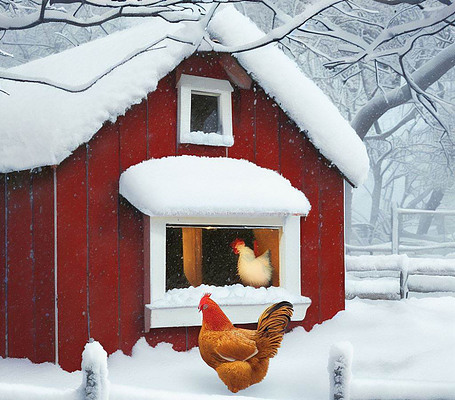Winter is coming, and thoughts of long, cold winter nights and short cold winter days make us start to think about how to keep our chickens warm and healthy. As we get into the intricacies of winter chicken coops, remember that a chicken’s comfort during the colder months directly impacts its health and egg production.
Understanding the Needs of Chickens in Winter
Temperature Requirements
Chickens, while hardy, have specific temperature needs. Ideally, they’re most comfortable between 45°F (7°C) and 75°F (24°C). Extreme cold can lead to decreased egg production, frostbite, and health issues. Hence, having a coop designed for winter can be a game-changer.
Ventilation vs. Insulation
Striking a balance between ventilation and insulation is akin to walking a tightrope. While insulation keeps the cold out, ventilation ensures there isn’t a buildup of moisture which can lead to frostbite and ammonia, which can lead to respiratory problems, other illnesses, and even death.
Essential Features of a Winter Chicken Coop
Insulation
Using the right materials for insulation can mean the difference between a cozy coop and a chilly chicken. Some top picks include:
- Foam boards: These offer solid thermal resistance.
- Reflective barriers: Reflects the chickens’ body heat back into the coop.
- Natural straw or hay: An organic way to keep the cold at bay.
Insulation must be covered so that chickens can’t peck it apart or eat it.
Flooring
Warm feet mean happy hens. Elevate your coop’s floor or use the deep litter method, where composting litter generates heat.
Roofing
A strong roof is a chicken’s first defense against snow and rain. Consider materials like asphalt shingles or metal roofing with insulation beneath for maximum protection.
Additional Coop Enhancements for Winter
Windows and Sunlight
Even in winter, chickens appreciate a sunbath. Position your coop windows to capture maximum sunlight, offering natural warmth.
Draft Guards
Cold drafts? No thanks! Identify draft-prone areas and seal them using weather stripping or draft guards.
Roosting Bars
Raised and insulated roosting bars give chickens a warm place to settle. Think wood – it doesn’t get as cold as metal. There are heated footwarmers/heaters available as well.
Monitoring and Maintenance
Regular Temperature Checks
Invest in a reliable thermometer. Place it at the chickens’ level and monitor regularly. If temperatures plunge, make necessary adjustments.
Dealing with Snow and Ice
Keep coop entrances and exits clear. Ice buildup can trap chickens inside, so regular checks are crucial. Less of a problem is keeping vents clear of snow. Although this seldom happens, it can under certain conditions.
Most folks aren’t as concerned about the integrity of their chicken coop as they are their own home, so if you are at all concerned about the weight of the snow piled atop your house, you might want to keep a close watch on your coop. A roof rake can come in handy at times.
Moisture Management
A damp coop can spell disaster in winter. Ensure good ventilation and consider absorbent materials like sand or wood shavings.
Common Mistakes to Avoid
Overheating the Coop
While it might be tempting to add a heater, they often cause more harm than good. Overheating can stress chickens, and there’s the risk of fire. If temperatures get dangerously low, consider safer alternatives like heat lamps designed for coops.
Neglecting Pest Control
Winter doesn’t deter all pests. Regularly check for signs of rodents or mites and take action.
Overcrowding
More chickens mean more body heat, right? Yes, but overcrowding can lead to health issues and stress. Ensure there’s adequate space for each bird.
Two to four feet per chicken lets your birds move freely while keeping the coop quite snug for the winter.
Sealing The Deal
Preparing your winter chicken coop is more than just a task; it’s a commitment to the well-being of your flock. Your chickens can thrive even in the coldest months with the right knowledge and materials.
Additional Resources
For more insights on chicken care during winter, consider checking out these coop ideas – an excellent resource for both beginners and seasoned chicken owners.
Dave
Chickenmethod.com


Hi Dave: I was looking for information on how to keep the water from freezing.
Do you have any products you would recommend?
How do you keep your water from freezing. If you have already wrote about it somewhere, I missed it, sorry in advance.
Donna
Hello, Donna. I have a couple of articles you can check out. One is about waterers in general, and the other is a review of a heated waterer that I like a lot.
Review: 2023 Updated Heated Poultry Waterer
CHICKEN WATERER – BEST CHICKEN WATERING SYSTEMS
There you go!
Dave